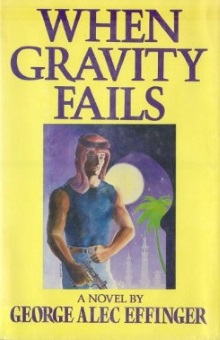
This is a novel that I would never have known about if not for the recommendation in What Makes This Book So Great. It was successful enough to spawn sequels but author George Alec Effinger died before a fourth book could be completed and the series never seemed to have won any major awards. Apparently a supplement for this setting was made for the pencil and paper role-playing game Cyberpunk 2020 which I do own.
Set in the near future in which the Muslim world is ascendant, Marîd Audran is a private detective cum street hustler who lives in the Budayeen, a crime-ridden quarter of an unnamed city somewhere in the Middle-East. He meets a man who hires him to find a missing relative but no sooner has the money changed hands than his client is immediately murdered by an assassin employing a James Bond moddy. This is a sort of personality and skills add-on that can be installed on anyone with the appropriate cybernetic enhancements. The assassin goes on to kill other personalities in the Budayeen and eventually Marîd is hired by the de facto boss of the quarter Friedlander Bey to crack the case. Bey however insists that Marîd be enhanced himself in order to be able to compete and after an acquaintance of his turns up dead as well, has to acquiesce. As you might expect, the case involves international politics, deranged killers, corrupt police and plenty of violence.
I don’t habitually read detective stories so it was fun to read what is most assuredly a sort of cyberpunk neo-noir story for a change. I found the plot to be unremarkable and I believe some fans of the genre might be disappointed in that Marîd usually doesn’t advance the investigation using logical deduction and observation so much as blundering blindly into things and getting lucky. The real draw of the book to me is the richness of the setting and the colorful characters who inhabit it. Marîd is very much the flawed protagonist. He isn’t without his principles and has some skills but he is also hypocritical and very frightened of dying. For example, almost alone in the Budayeen he has disdained installing the cybernetic prosthetics that allows one to chip in new skills and personalities but his motivations for doing so are a mixture of personal pride, being mindful of his local reputation and simple superstitious fear of how using it will alter his mind. Yet as Bey points out, he uses copious amounts of narcotics and seems unable to function without them. Though nominally Muslim and well versed in the local customs and ritualistic exchanges of politesse, he is un-observant and far from pious. He isn’t a likable character by any measure but it sure makes for an interesting life to read about.
From a science-fiction perspective, this is also one of those novels in which new technologies are used to add flavor to the plot but isn’t central to it. The moddies and daddies are immensely useful and powerful but at heart this is still an old-fashioned detective story. For all that Marîd disdains the need to carry weapons at the beginning of the story, having one seems to improve his odds quite a bit no matter how much his enemies’ cybernetics enhance them. I do have to say that despite being originally released in 1986, this novel does not in any way feel dated. If anything, the setting makes it an even more appealing read now than in the 1980s while the proliferation of transgender characters and how sex workers slot in personalities to cater to the preferences of their clients make it feel very hip. The relationship between Marîd and his love interest Yasmin, a trans woman who is deeply insecure about being born male, is especially well written. Also interesting is the intersection of Islamic values with how cybernetic implants are thought to pollute the natural mind and body and how Bey squares his piety with the need to resort to torture and violence to protect his interests.
This book didn’t make me a fan of cyberpunk noir but I did enjoy my foray into the genre. I didn’t like how it ends rather abruptly with Marîd’s status and circumstances in the Budayeen drastically changed but without more than a cursory examination of the consequences. I suppose that development is left for the sequels and I probably will get around to them one day as this was a good read. On the whole this doesn’t quite rise to the status of a classic, but I would agree that it’s an under-appreciated gem.